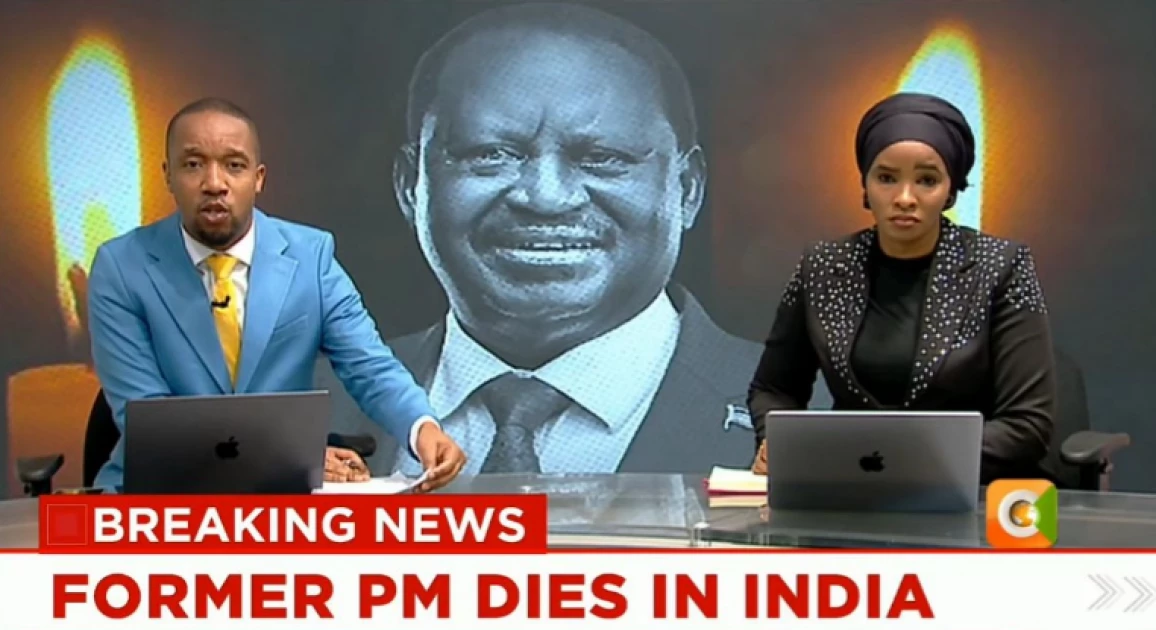Breaking the news: Inside the hour-long wait to announce Raila Odinga’s death


Audio By Vocalize
The newsroom is always a nucleus of curious reporters, assiduous editors and meticulous planning; however, with an equal share of pandemonium and pundits running on an incessant high to break news or report on the next biggest exposé.
This high was, however, doused on Wednesday, October 15, 2025, when business started with a distressing statement from my colleague. "Baba is dead", he said.
I wanted to brush off his words, but I could not; they were slowly etching on my arms, and they slowly felt heavy because what do you mean, Raila Odinga is dead?
I have been indifferent to Mr Odinga's prominence, but his influence has followed me long before Kenyan politics took a definitive shape, through my primary and secondary education up to when I found myself in the newsroom.
It is impractical to dismiss his influence in politics and beyond. He has been a man who has commanded generational support, one who has even seen his rivals nickname him "Agwambo", a Luo name meaning the mysterious one. He had seemingly embodied immortality.
I had opened a story by an Indian news outlet reporting that Mr Odinga died in India while recuperating, but it still felt vague, an allegation.
Minutes later, my editor Philip strides into the newsroom with a profound face, and the last time he wore it was in April when Chief of Defence Forces General Francis Omondi Ogolla died.
Seconds later, the newsroom's chief editor was frantically making calls and summoning all political reporters to the newsroom. This was no longer a speculation.
"Write it as we wait for publishing", Philip ordered. Online, another Indian outlet had published the story, and its details matched those of the first story.
At 9:00 am, social media was already awash with messages on Mr Odinga's death, but the newsroom sat tight, orders were given in hushed tones, and anxiety crept in.
Editors hurdled and made directive orations, Philip made incessant calls and never stopped gesturing with his index finger.
People were calling wondering why we were not telling the news of the death, they said they had seen it all across social media but they wanted to confirm with us if it was true.
My colleagues had drafted headlines: Raila dies in India, ODM leader Raila Odinga dies in India, Raila is dead, and the list never stopped.
At 10:00 am, Philip shouted, "ndiyo hiyo, chukua. Pin it and push notification". Citizen TV had also run the breaking news headline "Raila is dead".
It finally dawned on me that the man, the myth and the legend of Kenyan politics, was indeed, dead. There was however, no time to absorb the information, we had to break the news.
Within minutes, mourners had thronged Mr Odinga's home in Karen and Molo. The streets of Kisumu, Odinga's backyard, were also full and online conversations stiffened.
Breaking news in times of social media
Amid the melee, social media had already beaten the newsrooms to the story. But with the overabundance of information dissemination, journalism has slowly changed tactics; be factual rather than be first.
Accuracy remained key and calls to sources close to Mr Odinga had to be made, authorities had to be questioned to ascertain the demise.
What remains immutable, however, is that trust is still in legacy media. All speculations spreading online were treated as futile before newsrooms published the story.
Wikipedia, the ever-swift encyclopedia, also remained in the balance awaiting verified information about Odinga's death.
Amid speculation, Odinga's bio on Wikipedia read:
"This article is currently being heavily edited because its subject has recently died. Information about their death and related events may change significantly, and initial news reports may be unreliable. The most recent updates to this article may not reflect the most current information."
Prime Minister met his death on October 15 as he was walking with his sister, daughter, and a personal doctor, "when he suddenly collapsed", according to Indian police.
Odinga spent his early years in politics in jail and in exile, fighting for democracy during the autocratic rule of President Daniel Arap Moi.
He entered parliament in 1992 and ran unsuccessfully for the presidency in 1997, 2007, 2013, 2017 and 2022, claiming to have been cheated of victory in the last four elections.


Leave a Comment